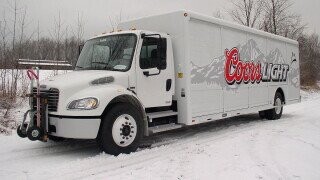That Time Coors Tried to Sell Non-Alcoholic Water (And Failed)

Spiked seltzers have been the trendy alcoholic beverage of choice for the past few years now. There is no shortage of companies that have made a name off “La Croix, but with alcohol,” and some of the most recognizable names in beer, like Bud Light, have entered the Seltzer Arms Race as well. One brewery was way ahead of the curve in monetizing water, though. In 1990, Coors introduced the market to Rocky Mountain Sparkling Water.
Yeah, just sparkling water; no alcohol involved. It did come in flavors, though, including original (which is by far the strangest way to describe the taste of water), lemon-lime, and cherry.

It shouldn’t come as too much of a surprise to learn that it only lasted a few years. Coors called it quits, and it has an impressively small legacy online. Sorry to spoil the ending here, but I mean, come on. It obviously wasn’t going to succeed, right?
Don't Miss
Or, was it? When people do talk about Coors Rocky Mountain Sparkling Water (like two people have ever talked about it), it’s usually in the conversation about the worst product ideas of all time. It wasn’t that bad of an idea if you think about it, though.
Firstly, bottled water was popular in the 1990s. Like, weirdly popular. A lot of the ideas that tap water is bad for you came from this time, and instead, all the cool kids were showing off their fancy bottled H20.
Also, if any brewery had a reason to sell water, it was Coors. Their water was already a major part of their branding anyway. Cans and commercials for Coors often boast that their beer is made with “100% Rocky Mountain Water” or some similar sentiment. Selling the water itself was a fairly obvious route to go.
On the other hand, the geniuses of marketing didn’t consider that everyone already associates the name “Coors” with one thing. Sure, the bottle doesn’t make it look like it would contain alcohol, but if you were desperately seeking a refreshing, non-alcoholic drink, would you immediately grab the bottle with the name of a beer on it? This might not be the only reason it didn’t sell well, but it was certainly part of it.
While most people just didn’t try it at all, there are reports of people who really liked Coors’ venture into sober drinking. Again, this makes sense because their water was already a selling point. It was just a selling point for beer, not for water on its own.
Fast-forward a few decades, there was an attempt to get the Coors name in the hard seltzer game, but this was discontinued already. Coors can’t win at water with or without alcohol. Better stick to beer.
Top Image: MobiusDaXter/Wiki Commons